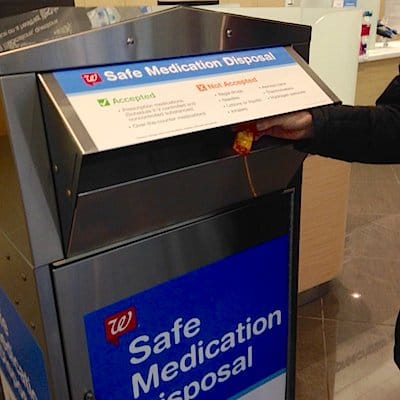DEERFIELD, Ill. — In an effort to stem the misuse of prescriptions and the rising incidence of overdoses, Walgreen Co. recently announced the launch of a new initiative to combat drug abuse.
Aligning with public and private sector campaigns, Walgreens is making opioid-overdose antidote naloxone available without a prescription in most of its stores.

The other prong of its approach to fighting the crisis of drug abuse, the company said, is the installation of safe medication disposal kiosks in more than 500 of its stores throughout 39 states and the District of Columbia, primarily at locations open 24 hours. According to Walgreens, this effort is the first of its kind offered by a national retailer.
The program will make the disposal of medications — including opioids and other controlled substances — easier and more convenient while helping to reduce the misuse of medications and increasing overdose deaths.
Naloxone, according to Walgreens, is a lifesaving opioid antidote administered by injection or nasal spray that can be used in the event of an overdose to reverse the effects of heroin or other opioid drugs. Naloxone became available without a prescription recently at Walgreens pharmacies throughout the state of New York and will be introduced without a prescription in Indiana and Ohio.
When implementation of the program is complete, naloxone will be available without a prescription in more than 5,800 of Walgreens nearly 8,200 stores, the company said. In states where a prescription is required, Walgreens says it is available and eager to work with regulators to help update rules to allow for dispensing of naloxone without a prescription.
Walgreens was joined at the launch, held at its Washington, D.C., flagship store earlier this month, by director of National Drug Control Policy for the White House Michael Botticelli. Joining Botticelli were Sen. Mark Kirk (R., Ill.); Rep. Bob Dold, (R., Ill.); Lou Milione, deputy assistant administrator for the Office of Diversion Control in the Drug Enforcement Administration; and Michael Nerheim, Lake County, Ill., state’s attorney.
The medication disposal kiosks allow individuals to safely and conveniently dispose of their unwanted, unused or expired prescriptions, including controlled substances and over-the-counter medications, at no cost, Walgreens said. The kiosks at Walgreens pharmacies will be available during regular pharmacy hours — 24 hours a day at most of these locations.
The initial installation of the safe medication disposal kiosks has already begun in California, and it is expected to be completed at more than 500 Walgreens locations this year.
“Walgreens pharmacists play an important role in counseling patients on the safe use of their medications, and now we are leading the way in retail pharmacy’s fight against prescription drug abuse,” said Walgreens president of pharmacy and retail operations Richard Ashworth. “We understand the challenges our communities face, and we stand ready to help our patients and customers lead healthier lives. When the stakes are this high, the solutions must be comprehensive.”
According to the 2014 National Survey on Drug Use and Health, an estimated 6.5 million Americans misused a prescription drug in 2014, and the Centers for Disease Control and Prevention reported a total of 47,055 drug overdose deaths, which include prescription and illicit drugs, during the same year. That is a 6.5% increase from 2013 and a 140% increase since 2000. Most people who misuse prescription drugs first obtain them from a family member or friend, often from a home medicine cabinet.
“Providing safe and convenient disposal options for prescription drugs and expanding access to the lifesaving overdose-reversal drug naloxone are critical parts of our national strategy to stop the prescription drug and heroin overdose epidemic, along with effective enforcement, prevention and treatment,” Botticelli commented.






